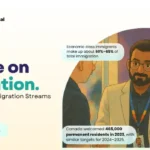Canada simplifies study permit rules for graduate students
Canada’s Big Change for International Graduate Students
Starting January 1, 2026, Canada is entering a new phase in its international education system. The government is making a major update to the study permit process, especially for master’s and doctoral students.
From this date onward, these students will no longer need to submit a provincial or territorial attestation letter (PAL or TAL) when applying for a study permit. Consequently, the process will become simpler, faster, and less stressful for international applicants.
Faster and Easier Study Permits
Previously, international students had to get an extra letter from the province confirming their admission, which often delayed their applications. However, that step will soon be completely removed, saving valuable time and effort.
PhD students will continue to benefit from the two-week fast-track processing system. Meanwhile, master’s students will also experience faster processing overall because the attestation requirement is being removed.
Moreover, there will be no caps or quotas on the number of students who can apply. This means every eligible applicant, regardless of their country or province, will have an equal opportunity to study in Canada.
Why This Change Matters
This policy change by Immigration, Refugees and Citizenship Canada (IRCC) further strengthens Canada’s reputation as one of the world’s most welcoming destinations for higher education, research, and innovation.
It not only eliminates unnecessary red tape but also makes it easier for students, families, and universities to plan with confidence. As a result, the process becomes more predictable, transparent, and efficient.
In short, everyone benefits — students enjoy less stress, universities receive more global talent, and Canada continues to attract bright minds from around the world.
Who Qualifies Under the 2026 Rules
Starting January 1, 2026, the simplified process will apply to:
- Students enrolled in master’s or doctoral programs at any Designated Learning Institution (DLI) in Canada
- Applicants who submit their applications online with all the required documents and fees
- Students who hold a valid Letter of Acceptance (LOA) from a recognized Canadian university or college
For PhD students, the two-week fast-track processing system will remain active once the LOA is verified and biometrics are completed.
Although master’s students will not be eligible for the two-week rule, their applications will still move faster due to fewer processing steps.
In addition, there are no quotas or limits on how many students can apply through this system. Therefore, every qualified applicant can benefit from these simplified pathways. rule.
Family Members Can Join Too
IRCC also recognizes that family support plays an important role in student success. Therefore, under the new rules, family members can apply together with the main student applicant.
Eligible dependents include:
- Spouses or common-law partners, who can apply for open work permits
- Dependent children, who can apply for study or visitor visas
- Dependent children of dependents
By submitting all applications together, families can enjoy faster and more coordinated processing. Consequently, they can travel together and begin their new life in Canada without long periods of separation.
Required Documents for Application
To make sure your study permit is approved quickly, you must have all documents ready.
Document Checklist
- Valid passport or travel document
- Two photos with name and date of birth written on the back
- Letter of Acceptance (LOA) from your university
- Proof of identity for you and family members
- Proof of funds for tuition, living costs, and travel
- Translated copies of non-English or non-French documents
- Letter of explanation (why you want to study in Canada)
- Medical and police certificates (if needed)
- Custodianship proof for minors under 17
Reminder: As of 2026, no PAL/TAL letters are needed.
Proof of Funds
Applicants must show they can afford tuition, living expenses, and travel for themselves and their dependents.
Accepted Proofs Include:
- Tuition or housing receipts
- Canadian bank account or GIC
- Approved student loan
- Recent bank statements (past 4 months)
- Financial support letter from a sponsor
- Scholarship or funding proof
Note: Students heading to Quebec must meet that province’s specific financial rules.
Staying and Working After Graduation
After completing your program, you can apply for a Post-Graduation Work Permit (PGWP) to gain valuable Canadian work experience.
Later, this experience can help you apply for permanent residency through:
- Express Entry (CEC), or
- Provincial Nominee Programs (PNPs)
This allows you to study, work, and settle permanently in Canada — all within a smooth pathway.
Common Reasons for Delays (And How to Avoid Them)
Even though the process is faster now, mistakes can still delay your file.
Avoid:
- Incomplete forms
- Late biometrics
- Uploading documents in wrong sections
- Missing translations
- Slow LOA validation by your school
Always double-check your application before submission.
Key Takeaways
- No more PAL/TAL letters for Master’s and PhD students (Jan 2026)
- Two-week fast-track for PhD students continues
- No caps or quotas — open to all eligible students
- Family members can apply together
- Graduates can work and later apply for PR
- Canada strengthens its position as a top study destination
Summary
This 2026 reform is a game-changer for international education in Canada.
By removing attestation letters and keeping the fast-track for PhD applicants, Canada has made the study-permit system more inclusive, efficient, and student-friendly.
Students gain speed and clarity, universities gain global competitiveness, and Canada gains innovation and talent.
This new era truly makes Canada the world’s most welcoming destination for higher education.
Get in touch with us
Receive professional advice on any of your questions regarding Canadian immigration. get in touch with us, experienced immigration consultants from SPS Global. For additional information, contact support@spscanada.com (Canada) or support.amd@spscanada.com (Ahmedabad), or by phone at (1) 905-362-9393 (Canada) or +919586226232 (Ahmedabad).



